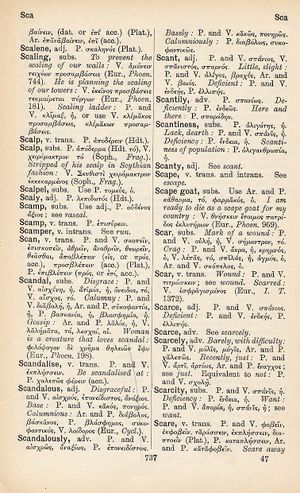scandal: Difference between revisions
From LSJ
Ἴσον ἐστὶν ὀργῇ καὶ θάλασσα καὶ γυνή → Mulier et mare sunt isdem plane moribus → In ihrem Naturell sind Frau und Meerflut gleich
(Woodhouse 4) |
(CSV5) |
||
| Line 1: | Line 1: | ||
{{ | {{Woodhouse1 | ||
| | |Text=[[File:woodhouse_737.jpg|thumb|link={{filepath:woodhouse_737.jpg}}]]'''subs.''' | ||
<b class="b2">Disgrace</b>: P. and V. [[αἰσχύνη]], ἡ, [[ἀτιμία]], ἡ, [[ὄνειδος]], τό, V. [[αἶσχος]], τό. | |||
<b class="b2">Calumny</b>: P. and V. [[διαβολή]], ἡ, Ar. and P. [[συκοφαντία]], ἡ, P. [[βασκανία]], ἡ, [[βλασφημία]], ἡ. | |||
<b class="b2">Gossip</b>: Ar. and P. λαλία, ἡ, V. λαλήματα, τά, λεσχαί, αἱ. | |||
<b class="b2">Woman is a creature that loves scandal</b>: φιλόψογον δὲ [[χρῆμα]] θηλειῶν ἔφυ (Eur., ''Phoen.'' 198). | |||
}} | }} | ||
Revision as of 10:02, 21 July 2017
English > Greek (Woodhouse)
subs.
Disgrace: P. and V. αἰσχύνη, ἡ, ἀτιμία, ἡ, ὄνειδος, τό, V. αἶσχος, τό.
Calumny: P. and V. διαβολή, ἡ, Ar. and P. συκοφαντία, ἡ, P. βασκανία, ἡ, βλασφημία, ἡ.
Gossip: Ar. and P. λαλία, ἡ, V. λαλήματα, τά, λεσχαί, αἱ.
Woman is a creature that loves scandal: φιλόψογον δὲ χρῆμα θηλειῶν ἔφυ (Eur., Phoen. 198).

